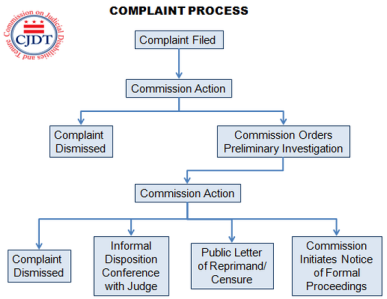Complaints or Concerns on Judicial Conduct
The Commission reviews all concerns and complaints whether written or oral, formal or informal, concerning the conduct of judges. The Commission values all inputs from the public, positive and negative. However, the Commission is not a court of appeals and does not have jurisdiction to review or change judicial decisions on law, procedures, or fact, nor does it have the power to correct or sanction a judge’s legal errors.
Examples of on the bench or off the bench judicial conduct or concerns that the Commission may act on, however, include: intemperate, rude, abusive, or improper treatment of lawyers, witnesses, jurors, Court staff or others; showing bias toward anyone in the courtroom based on gender, race, ethnicity, religion, etc.; improper ex parte communications unless permitted by law; lapses in the fair and proper administration of justice; judicial delay or timeliness concerns; improper use or misuse of a judge’s authority, stature or position; publicly commenting on a pending or expected case or lawsuit; failure to cooperate with a Commission inquiry; and criminal behavior.
How to File a Complaint
Complaints or concerns may be submitted formally in writing through the Commission’s online website, by email, or written letter; or formally or informally through a Commissioner, Commission staff, or the Commission’s independent Special Counsel. If the complaint relates to a specific case and/or hearing, the case number, date of the hearing, and other details will be essential to aid the Commission’s review.
Complainants can decide whether to identify themselves or submit the complaint anonymously. Where detailed information is provided, anonymous complaints are treated like all other complaints. However, if information is limited and follow-up is not possible, the Commission may be limited in its ability to investigate the matter.
- Online: File a Judicial Complaint online
- Email: [email protected]
- Mail:
District of Columbia Commission on Judicial Disabilities and Tenure
515 Fifth Street, NW
Room 246
Washington, DC 20001
For complaints sent by email or mail, you may download and print the Complaint Form. Please do not submit original records. The Commission cannot return any documents you send us with your complaint.
The Complaint Review Process
The Commission reviews all complaints to determine if it has jurisdiction over the judge and the matter raised. The Commission is assisted in its review by staff and the Commission’s independent special counsel.
If the Commission does have jurisdiction, the Commission will determine if the information provided warrants further investigation and, if so, additional steps will be taken, such as, review of court records, case files, transcripts, hearing tapes, correspondence, and other relevant documentation, such as medical records. As appropriate, the Commission also may direct that informal or formal interviews of the complainant, witnesses, and/or the judge be conducted or that in person or virtual observation of court proceedings be made.
 After gathering and reviewing relevant evidence:
After gathering and reviewing relevant evidence:
1. If the Commission determines the evidence does not support the allegations or concerns in the complaint or otherwise warrant further investigation, the Commission will dismiss the complaint.
2. If the Commission determines the judge’s conduct constitutes misconduct or otherwise falls within its statute, but does not warrant removal or involuntary retirement, the Commission may impose a lesser sanction, such as: a public censure, a non-public letter or reprimand, or private counselling, or other form of agreed-upon resolution to avoid or mitigate future problems.
3. If the Commission determines the complaint has merit and the conduct justifies formal proceedings against the judge, the Commission will take steps required by statute to formally notice the judge and institute formal proceedings to remove or involuntarily retire the judge from office.
In considering claims of misconduct, the Commission looks to the District of Columbia Code of Judicial Conduct, the advisory opinions of the District of Columbia Courts’ Advisory Committee on Judicial Conduct, among other resources. Judges under its jurisdiction are deemed to be on notice of the Commission’s published actions as well. The Commission conducts its proceedings pursuant to Rules which appear in 28 District of Columbia Municipal Regulations Chapter 20.
Confidentiality:
All complaints and information received by the Commission and the Commission’s investigation to evaluate and resolve complaints are privileged and confidential by law, absent a statutory exemption. See D.C. Code §11-1528(a)-(b). The filing of a complaint and the information provided also is subject to confidentiality under this law.
Confidentiality protects the complainant, witnesses who cooperate with the Commission, and the judge. Therefore, it is entirely possible that a complainant will not be made aware of the Commission’s investigation or specific actions or discussions with respect to his or her complaint. However, the Commission considers every complaint carefully, and complainants will be informed when the matter has been resolved.
______
- Submit a complaint online
- Download and print the Complaint Form
- Email a complaint: [email protected]
______
The Commission encourages the public to provide feedback or ask questions about the complaint system at [email protected].


